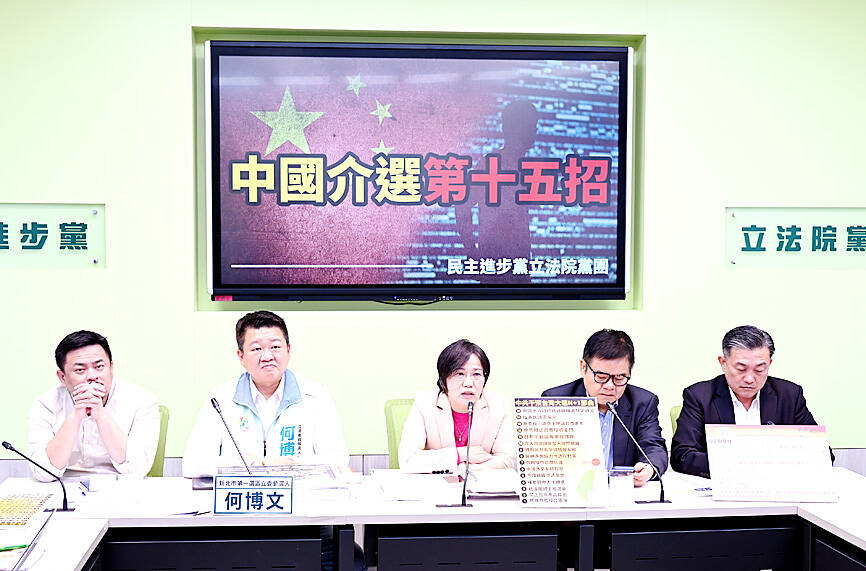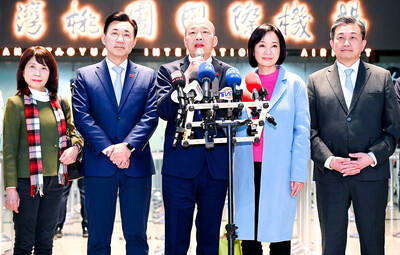China’s attempts to promote cross-strait integration ahead of next year’s presidential election would not be effective, a Taiwanese academic said yesterday.
Leading up to the presidential election in January, Beijing is likely to hold a variety of “united front” activities to implement its cross-strait integration policy, National Cheng Kung University political science professor Hung Chin-fu (洪敬富) said.
China aims to create an impression that Taiwanese politicians and businesspeople respond positively to such a policy by inviting them to cross-strait events, he said.

Photo: Chu Pei-hsiung, Taipei Times
For example, on Saturday, Keelung Mayor George Hsieh (謝國樑) of the Chinese Nationalist Party (KMT) and Foundation for Cross-Strait Peace and Development CEO Lien Sheng-wu (連勝武) participated in a ceremony celebrating the launch of “cross-strait exchange and integration month” in Shenzhen.
They were attending at the invitation of China’s Taiwan Affairs Office (TAO).
At the ceremony, TAO Deputy Director Pan Xianzhang (潘賢掌) called on “compatriots from both sides of the Taiwan Strait” to adhere to the so-called “1992 consensus,” resolutely oppose Taiwanese independence and jointly pursue the great rejuvenation of China.
The “1992 consensus,” a term former Mainland Affairs Council chairman Su Chi (蘇起) in 2006 admitted making up in 2000, refers to a tacit understanding between the KMT and the Chinese Communist Party (CCP) that both sides of the Strait acknowledge there is “one China,” with each side having its own interpretation of what “China” means.
The TAO previously said that about 800 Taiwanese were to attend the Cross-Strait CEO Summit in Nanjing today, which demonstrated the strong desire of the business community to boost exchanges and cooperation across the Strait, as well as to promote peaceful and integrated cross-strait relations.
Contrary to its alleged move to threaten Taiwanese businesspeople not to join the investment inspection tour to Kinmen, which was organized by the Straits Exchange Foundation, Beijing invited them to participate in its CEO summit, an attempt to intervene in Taiwan’s presidential election, Hung said.
China is attempting to spread the idea that peace and prosperity requires electing a candidate who supports integrated development across the Strait, while electing the Democratic Progressive Party’s (DPP) candidate, Vice President William Lai (賴清德), might lead to war, he said.
Cross-strait exchanges are Beijing’s focus this year, so it would organize more events to pursue this goal before the election, Cross-Strait Policy Association researcher Wu Se-chih (吳瑟致) said.
The summit and local youth entrepreneurship and cross-strait exchange activities are used as tools to echo Beijing’s policies toward Taiwan, he said.
Promoting cross-strait integration is an attempt to intervene in the election, he said, pointing to some events related to the National Palace Museum as an effort to arouse positive sentiment toward China.
However, the effect of these efforts on voters would be limited, he said.
In related news, the DPP caucus yesterday questioned whether KMT Legislator Hung Mong-kai (洪孟楷) approved of the Association of Taiwan Investment Enterprises on the Mainland’s goal of promoting cross-strait unification and whether his family invests in China.
Hung’s father, Hung Hsi-yao (洪璽曜), had long held important positions in the association, the caucus said.
Hung Hsi-yao’s tenure with the association largely overlapped with the legislative terms of his wife, former KMT legislator Kuo Su-chun (郭素春), and Hung Mong-kai and, it added.
The association serves the interest of the Chinese Communist Party, instead of Taiwan or Taiwanese businesses, DPP Legislator Wang Ting-yu (王定宇) said.
The association is directly affiliated with the TAO and its charter states that it abides by the Constitution of the People’s Republic of China, he said.
Hung Hsi-yao was one of the founding members of the association and served as the deputy secretary-general in 2007 and the executive director until 2020, he said.
Kuo was a legislator from 2004 to 2012, while Hung Mong-kai has been a legislator since 2020.
Hung Mong-kai yesterday responded to the caucus’ remarks, saying that the DPP’s attempts at electoral manipulation are “cheap.”
Additional reporting by Chen Cheng-yu and Lin Hsin-han

TRAGEDY: An expert said that the incident was uncommon as the chance of a ground crew member being sucked into an IDF engine was ‘minuscule’ A master sergeant yesterday morning died after she was sucked into an engine during a routine inspection of a fighter jet at an air base in Taichung, the Air Force Command Headquarters said. The officer, surnamed Hu (胡), was conducting final landing checks at Ching Chuan Kang (清泉崗) Air Base when she was pulled into the jet’s engine for unknown reasons, the air force said in a news release. She was transported to a hospital for emergency treatment, but could not be revived, it said. The air force expressed its deepest sympathies over the incident, and vowed to work with authorities as they

A tourist who was struck and injured by a train in a scenic area of New Taipei City’s Pingsi District (平溪) on Monday might be fined for trespassing on the tracks, the Railway Police Bureau said yesterday. The New Taipei City Fire Department said it received a call at 4:37pm on Monday about an incident in Shifen (十分), a tourist destination on the Pingsi Railway Line. After arriving on the scene, paramedics treated a woman in her 30s for a 3cm to 5cm laceration on her head, the department said. She was taken to a hospital in Keelung, it said. Surveillance footage from a

BITTERLY COLD: The inauguration ceremony for US president-elect Donald Trump has been moved indoors due to cold weather, with the new venue lacking capacity A delegation of cross-party lawmakers from Taiwan, led by Legislative Speaker Han Kuo-yu (韓國瑜), for the inauguration of US president-elect Donald Trump, would not be able to attend the ceremony, as it is being moved indoors due to forecasts of intense cold weather in Washington tomorrow. The inauguration ceremony for Trump and US vice president-elect JD Vance is to be held inside the Capitol Rotunda, which has a capacity of about 2,000 people. A person familiar with the issue yesterday said although the outdoor inauguration ceremony has been relocated, Taiwan’s legislative delegation has decided to head off to Washington as scheduled. The delegation

Another wave of cold air would affect Taiwan starting from Friday and could evolve into a continental cold mass, the Central Weather Administration (CWA) said yesterday. Temperatures could drop below 10°C across Taiwan on Monday and Tuesday next week, CWA forecaster Chang Chun-yao (張竣堯) said. Seasonal northeasterly winds could bring rain, he said. Meanwhile, due to the continental cold mass and radiative cooling, it would be cold in northern and northeastern Taiwan today and tomorrow, according to the CWA. From last night to this morning, temperatures could drop below 10°C in northern Taiwan, it said. A thin coat of snow